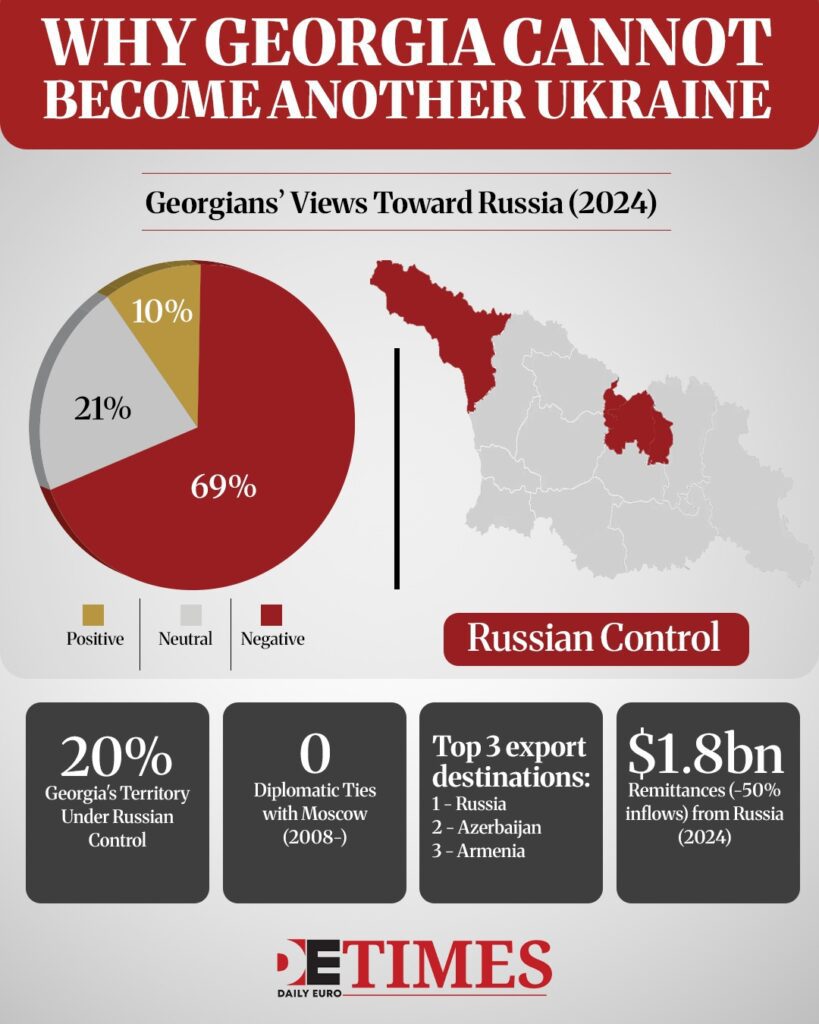Supporters of the opposition tried to storm Georgia’s presidential palace on 4 October, following the municipal elections. The ruling party, Georgian Dream, still controls most local governments.
Former President Salome Zourabichvili left the Orbeliani Palace in December 2024 after Mikheil Kavelashvili was sworn in.
Why Georgia Cannot Become Another Ukraine
Protests in the streets won’t by themselves change Georgia’s current political path. Georgia shares a war history with Russia from 2008 and has no diplomatic relations with Moscow.
About 20% of Georgian territory remains under Russian military control in the regions of Abkhazia and South Ossetia.
The economic picture is quite different from the politics. Direct flights between Russian cities and Tbilisi started again in 2023.
Since February 2022, many Russian emigrants and tourists have come to Georgia. In February this year, a Georgian-Russian business association was set up with approval from Tbilisi authorities. Sixty companies mainly linked to wine exports joined.
Georgia has avoided supporting European sanctions against Russian economic interests.
The Economics Behind Political Calculation
Georgia’s government makes decisions based on economic realities. Russia represents a huge consumer market for Georgian agricultural products.
Simplified visa agreements came back in 2023 and 2024, making it easier for Georgians to work in Russia.
Therefore, trade matters more in shaping foreign policy than protests in the streets. Georgia has recorded strong GDP growth over the last four years.
Ukrainian President Volodymyr Zelensky claimed at the UN that Europe has lost Georgia. Tbilisi’s Mayor Kakha Kaladze told Zelensky to focus on Ukraine’s issues first.
What Brussels Offers Versus What Moscow Delivers
EU membership still feels very far off for Georgia. The EU has committed €50 billion over four years to help Ukraine prepare for accession.
Georgia only holds Association Agreement status and lacks similar financial support.
Whilst Europe demands extensive reforms in governance and the legal system, these changes take many years to carry out and confirm.
However, Russia offers immediate economic benefits via trade and tourism. Russian visitors brought valuable foreign cash to Georgian businesses in 2023 and 2024. Winemakers and those in hospitality saw increasing income from Russian tourists.
Why Street Protests Cannot Override Economic Logic
During Saturday’s palace protest, speakers called on people to take power themselves. Riot police used tear gas and water cannons in response.
Opposition parties boycotted the municipal elections but promised peaceful revolution afterward.
Prime Minister Irakli Kobakhidze accused the EU of meddling in Georgian politics and vowed to neutralise what he called foreign agents.
As such, protests cannot change Georgia’s reliance on trade or its geographic closeness to Russia. Small countries next to powerful neighbours have to make pragmatic choices to survive.
The Ukraine comparison doesn’t hold because Kyiv received significant military and financial support from the West. Georgia’s population of 3.7 million faces a very different reality.
Western governments urged Georgia to open another front against Russia after February 2022, but Tbilisi refused, prioritizing national survival.
The Reality of Post-Soviet Economic Geography
Georgian businesses export wine, farm products, and tourism services. Russia remains their largest reachable market.
European markets require meeting strict standards and certifications, which raise costs. Longer distances also increase transport expenses, cutting into profits.
Despite this, 69% of Georgians hold negative views towards Russia. Yet public opinion does not erase decades of economic ties and dependencies.
The government chooses economic growth over closer Western security ties, reflecting practical limits rather than purely ideological decisions.
Occupied territories create lasting vulnerability to Russian pressure. Moscow maintains de facto embassies on Georgian soil through recognition of Abkhazia and South Ossetia.

What the Palace Protest Actually Achieves
Saturday’s protests led to five arrests and scattered crowds. The presidential palace gate suffered only minor damage.
The government’s hold on local power remains firm after the elections. The opposition’s election boycott weakens their chances to gain real power.
Protests express frustration but don’t offer economic alternatives. Demonstrators can’t replace Russian tourist spending or trade access by street action.
The Ukraine comparison misleads about what options Georgia really has. Kyiv benefits from NATO weapons, intelligence, and sanctions against Russia.
Georgia gets no similar military help or financial support for confrontation. Brussels considers EU membership unrealistic right now.
Post-Soviet states cannot ignore their economic environment through political theater. Palace protests may get media attention but won’t change trade realities.
The Georgian government will keep seeking economic ties with Russia because small countries survive by adapting to power, not by symbolic resistance.
Keep up with Daily Euro Times for more updates!
Read also:
Zangezur Corridor Gives US New Eurasian Leverage
EU Accession: Armenia Takes a Leap of Faith
A Tug of War: Türkiye and its Rivals in Syria






